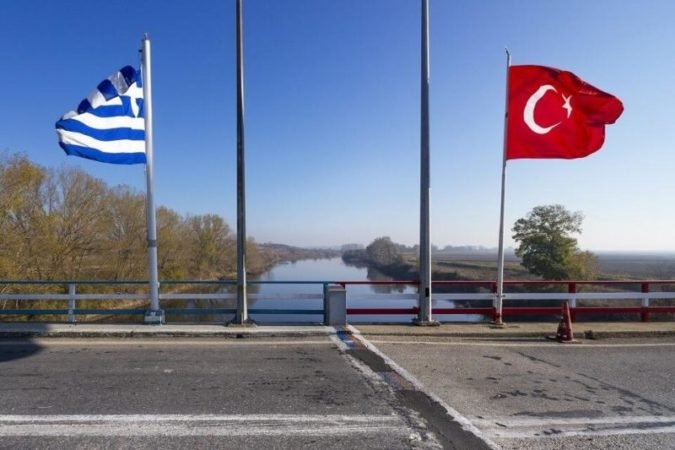A Shift in Evros River Escalates Tension at Turkish-Greek Border

The Turkish-Greek border, which runs along a twelve-kilometre-long stretch of Evros river is in the headlines again. The Turkish militia and police forces have encroached a small piece of land in the pocket of Apiary at Feres town of the Greek territory and have set up their camps. This move was motivated by the recent shift of the Evros River towards the east, which comes under the administration of Ankara.
Turkey refused to acknowledge that the river sometimes digresses from its natural flow and gets tilted slightly towards east or west, thereby creating alluviums on both sides. This de facto shift in the environmental pattern should not permit any of the countries to claim on the land which momentarily comes on their side.

The river which bifurcates the two countries was decided as a natural border in 1926 which later on was commonly referred to as the ‘river of death’. The border stands at a focal point of division between war-torn Western Asia and affluent Europe. The fluidity of the border can be assessed from the fact that hundreds of migrants die every year in the attempt to reach Greece by crossing the Evros river.
The border area witnessed clashes in March when Turkish President Recep Tayyip Erdogan said that it would no longer stop the outflux of migrants who want to march to the European Union. The Turkish militia attempted to facilitate tens of thousands of illegal migrants to go to the other side. This caused waves of distress in the Athens which was already facing the brunt of over 100,000 refugees. Soon after, it announced to strengthen the fences of the border and plausibly even build a border wall.
This move by Athens without consulting its Mediterranean neighbour did not go well with Ankara, and the dispute escalated with the recent alleged island occupation which is sized approximately 2.5 hectares.
The Greek armed forces have outrightly dismissed reports of the Turkish invasion. Greek Foreign Minister Nikos Dendias issued a statement saying that “no foreign power is on Greek soil.” Speaking to broadcaster Skai TV on Sunday, he rejected reports of a Turkish incursion as “nonsense,” adding that Turkey was attempting to “militarize the dispute” but said Athens would avoid walking into this trap.
The relationship between the two countries further plummeted when Egemen Bagis, former Turkish Minister of EU Affairs on TRT World Now explicitly said that Turkey will never tolerate a fait accompli at the border and construction should not start without coordination. When asked what reaction Greece could expect from Turkey if they don’t abide by it, Bagis said: “what happened in the Mediterranean with Cyprus should have taught them a lesson” in reference to Turkey’s 1974 invasion of Northern Cyprus.
However, this does not stop here and the Greek Government’s spokesperson Stelios Petas took it ahead by saying, Greece will not be provoked by Turkey and is in the strongest position it has been in for years.
“It’s one thing to be provocative and another to be strong. We are taking the necessary steps to defend our sovereign rights. We have calmness and a responsible attitude and this is what all Greeks have seen in practice and not in words,” said Petsas.
He also suggested media to use the expressions carefully while referring to Foreign Policy and not reproduce the Turkish propaganda


















